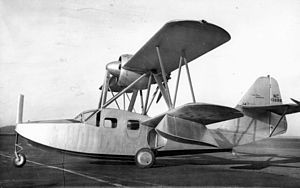Curtiss-Wright CA-1
| CA-1 | |
|---|---|

| |
| Role | Biplane amphibian |
| National origin | United States |
| Manufacturer | Curtiss-Wright |
| Designer | Frank Courtney |
| First flight | 1935 |
| Number built | 3 |
The Curtiss CA-1 (sometimes known as the Commuter or the Courtney Amphibian) was an American five-seat biplane amphibian designed by Frank Courtney and built by Curtiss-Wright at St Louis, Missouri.[1]
Design and development
[edit]Designed by the British test pilot Frank Courtney, the CA-1 was a five-seat amphibian.[1] The CA-1 was powered by a 365 hp (272 kW) Wright 975E-1 radial, cowled and fitted into the leading edge of the top wing driving - through an extension shaft - a pusher propeller.[1] It had a tricycle amphibian landing gear and an enclosed cabin for the pilot and passengers.[1] Only three aircraft were built, and they were all sold in Japan,[1] designated Curtiss-Wright LXC (Navy Experimental Type C Amphibious Transport) by the Imperial Japanese Navy Air Service.[2]
Specifications
[edit]Data from Curtiss Aircraft 1907–1947[3]
General characteristics
- Crew: one
- Capacity: four passengers
240 lb (110 kg) baggage[4] - Length: 31 ft 0 in (9.45 m)
- Wingspan: 40 ft 0 in (12.19 m)
- Height: 12 ft (3.7 m)
- Airfoil: NACA 2412[5]
- Empty weight: 2,980 lb (1,352 kg)
- Gross weight: 4,650 lb (2,109 kg)
- Powerplant: 1 × Wright R-975E-1 Whirlwind 9-cylinder air-cooled radial piston engine, 365 hp (272 kW)
- Propellers: 2-bladed fixed-pitch pusher propeller
Performance
- Maximum speed: 151 mph (243 km/h, 131 kn)
- Cruise speed: 125 mph (201 km/h, 109 kn)
- Stall speed: 60 mph (97 km/h, 52 kn)
- Range: 550 mi (890 km, 480 nmi)
- Service ceiling: 14,000 ft (4,300 m)
- Rate of climb: 835 ft/min (4.24 m/s)
See also
[edit]Related lists
References
[edit]- ^ a b c d e Orbis 1985, p. 1279
- ^ "Japanese Navy Aircraft".
- ^ Bowers, Peter M. (1979). Curtiss aircraft, 1907-1947. London: Putnam. pp. 396–397. ISBN 0370100298.
- ^ Flight 1934 p821
- ^ Lednicer, David. "The Incomplete Guide to Airfoil Usage". m-selig.ae.illinois.edu. Retrieved 16 April 2019.
Bibliography
[edit]- The Illustrated Encyclopedia of Aircraft (Part Work 1982-1985). Orbis Publishing.
- "Anglo-US Experiment" Flight 14 October 1937
- "Latest Curtiss-Wright Amphibian" Flight 9 August 1934. p821
